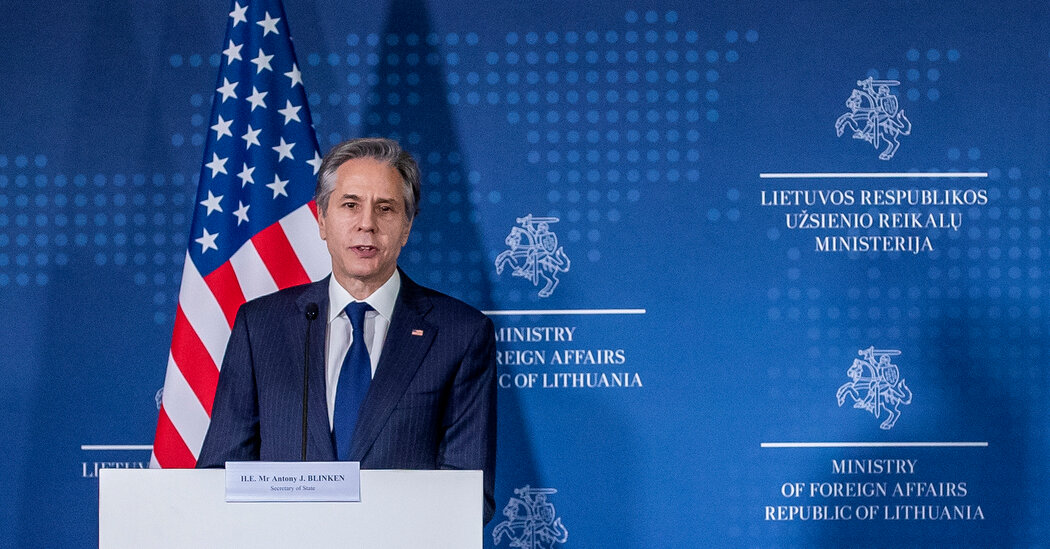
VILNIUS, Lithuania — Demanding assurances that the Baltic States will not become Russia’s next battleground, Lithuania’s president firmly told America’s top diplomat on Monday that warnings to deter Moscow from further aggressions are “no longer enough.”
Hours later, Latvia’s foreign minister dismally predicted that Russia’s invasion of Ukraine would shatter any belief that the region could ever let down its guard against President Vladimir V. Putin. “We have no illusions about Putin’s Russia anymore,” Foreign Minister Edgars Rinkevics said. “I don’t see any good reason to assume Russia might change its policy.”
Secretary of State Antony J. Blinken is likely to get a similar earful on Tuesday in Estonia as he tries to convince Baltic leaders, who are also part of NATO, that the United States is doing all it can to stop Russia’s assault on Ukraine from spreading across Europe — while remaining careful not to set off a wider war.
In a region that borders Russia, and which all too well remembers the forced rule of the Soviet Union, the Baltics are warily watching the crisis in Ukraine as a bellwether for their own security. Ukrainian flags are hung from doorways and draped from balconies across the capitals of Lithuania and Latvia. Blue-and-yellow posters, lights and billboards broadcast the region’s support for Ukraine. In Vilnius, the Lithuanian capital, a commuter bus had replaced its digital route display on Monday with a message that read, simply, “Vilnius ???? Ukraina.”
In Riga, the Latvian capital, Mr. Blinken said it was “very moving” to see the outpouring of support for Ukraine in the Baltics, which he praised as a longtime “democratic wall” against authoritarian rule.
But Baltic leaders appear unsatisfied with the level of military support the United States is providing to help deter Russian advances, either to Ukraine directly or to its allies in Europe. Mr. Rinkevics also said international sanctions against Mr. Putin’s allies could be toughened, and he called on European states to stop the oil and gas imports from Russia that have become Moscow’s economic lifeline.
Russia provides 10 percent of the world’s oil and more than a third of the European Union’s natural gas. Western sanctions are largely engineered to allow companies in Europe to continue to buy Russian energy, and the White House has resisted more aggressive penalties for fear that they would drive up the price of gasoline and other energy costs for Americans.
Europe, Baltic leaders told Mr. Blinken, has entered a new chapter.
“Unfortunately, the worsening security situation through the Baltic region is of great concern for all of us and around the world,” said President Gitanas Nauseda of Lithuania. “Russia’s reckless aggression against Ukraine once again proves that it is a long-term threat to European security, the security of our alliance, no matter how the end of the war in Ukraine comes.”
He added: “I must say that strengthening deterrence is no longer enough, and we need more defense here in place. Otherwise, it will be too late here, Mr. Secretary. Putin will not stop in Ukraine if he will not be stopped.”
Mr. Blinken sought to reassure the officials that, as fellow members of NATO, the Baltic States would be robustly defended should Russia try to move in.
Citing the NATO collective defense pact that “an attack on one is an attack on all,” Mr. Blinken said the United States and the rest of the military alliance “will defend every, every inch of NATO territory should it come under attack.”
Russia-Ukraine War: Key Things to Know
“There should be no doubt about that on anyone’s mind,” Mr. Blinken said.
It was a message he repeated throughout the day.
There are already thousands of American troops in the Baltics, the majority of which were sent in the face of Russia’s recent aggressions, and Mr. Blinken noted that the Pentagon has sent F-35 fighter jets as it considers a more permanent presence of U.S. forces to the region.
At the same time, the United States and other NATO states have rushed more than 17,000 antitank weapons, including Javelin missiles, to Ukraine in an effort to help the besieged country defend itself from Russia’s far more powerful military. Mr. Blinken said an estimated 70 percent of assistance provided by the United States is already in Ukraine’s hands.
Though Ukraine’s leaders have pleaded for NATO to establish a no-fly zone over its skies — a demand that the country’s foreign minister, Dmytro Kuleba, delivered to Mr. Blinken this past weekend at Ukraine’s border with Poland — neither the United States nor the rest of the military alliance is willing to take that step, worried that it would escalate a conflict that has already created the largest refugee crisis in Europe since World War II.
Mr. Blinken also sidestepped a question on Monday as to whether Poland would provide its fighter planes to Ukraine after being equipped with American F-16 jets, although he said earlier this week that the deal was being considered.
Whether it can go though quickly enough to stanch the bloodshed in Ukraine, where Russian shelling has killed civilians and millions of people have been left homeless, is not yet clear.
What is more obvious is how heavily the casualties are weighing on the Baltics.
“We cannot afford for Ukrainian cities to become another Srebrenica, Grozny, or Aleppo,” said Gabrielius Landsbergis, Lithuania’s foreign minister.




